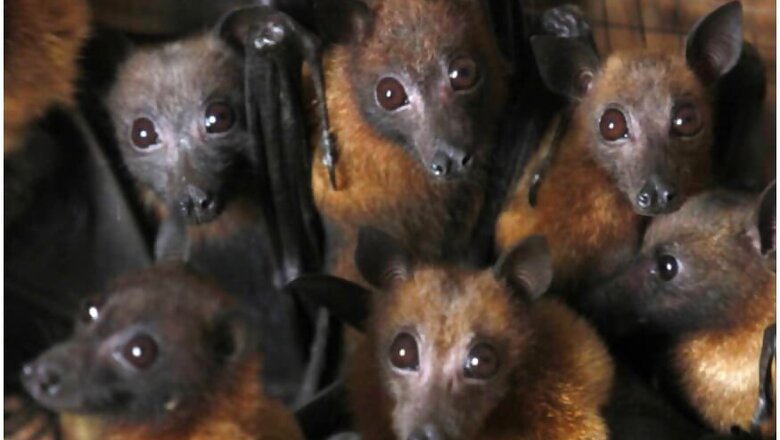
views
New Delhi: In a first for India, pathogenic coronaviruses have been found in two species of Indian bats – Indian Flying Fox and Rousettus (old world fruit bats) – a scientific study of the Indian Council of Medical Research (ICMR) on presence of bat coronaviruses revealed.
Swab samples of 25 these bat species collected from Kerala, Tamil Nadu, Himachal Pradesh and Puducherry tested positive after reverse-transcription polymerase chain reaction (RT-PCR) tests were carried out.
However, it is too early to say if these coronaviruses can affect humans adversely as no such study has been conducted on the issue yet, an official source said.
These findings are part of a larger study being done in India for the first time to research the presence of bat coronavirus (Bt-CoV), the source added.
The ICMR study, carried out jointly with a team of scientists from National Institute of Virology (NIV), Pune, was published in the Indian Journal of Medical Research.
The outbreak of COVID-19 disease caused by SARS-CoV-2 (severe acute respiratory syndrome coronavirus 2) virus has been linked to bats and pangolins, but there is no conclusive evidence yet to prove that the virus jumped from bats to humans via an intermediary species.
The ICMR-NIV study was carried out on samples collected between 2018 and 2019 from the forests of Kerala, Karnataka, Tamil Nadu, Himachal Pradesh, Punjab, Gujarat, Odisha, Telangana, Chandigarh and Puducherry.
Roosting sites of bats were identified in these states and with the permission of state wildlife departments, the researchers trapped bats and collected their rectal and nasal swabs. Twelve bats also died in the process of trapping, the study said.
A total of 508 samples of Indian Flying Fox bats and 78 samples of Rousettus bats were collected, as per the study. Of these, four samples of Rousettus samples and 21 samples of Indian Flying Fox tested positive for BtCoV.
All four of the Rousettus samples that tested positive were from Kerala. Among the 21 flying fox samples that tested positive, 12 were from Kerala, six were from Puducherry, two were from Himachal Pradesh and one was from Tamil Nadu.
According to the results of the study, only the rectal swab samples tested positive in both species, while the throat all the swab samples tested negative.
Official sources aware of the ongoing research developments said two more species of bats will be tested for presence of coronaviruses. Bats have been the focus of several such studies as it has been found that they are the natural reservoirs of many viruses, some of which are potential human pathogens.
Studies have also shown that the immune system of bats can defend against different viruses. But when these viruses cross over to humans through an intermediary, they cause immense harm. News18 could not get an official response from the authors of the paper immediately.
In 2018, ICMR-NIV had successfully linked the Nipah outbreak in Kerala to fruit bats. Even the 1998-1999 outbreak of Nipah virus in Malaysia was eventually linked to fruit bats. It was crossed over to humans via pig farms in Malaysia.
The paper called for more proactive and evidence-based surveillance to identify emerging novel viruses with epidemic potential. The paper said it is still not understood why only certain coronaviruses infect human beings.
“There is a need of proactive surveillance of zoonotic infections in bats...the detection and identification of such viruses from bats also recommends cross-sectional antibody surveys (human and domestic animals) in localities where the viruses have been detected”, the paper said.


















Comments
0 comment